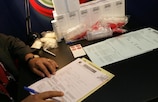WU17s warned that cheats never prosper
Thursday, June 27, 2013
Article summary
"If you cheat to win, that victory is not worth anything," players at the UEFA European Women's Under-17 Championship were told as they were warned about the dangers of doping.
Article top media content

Article body
"Doping is cheating – and don't ruin your career before it has started." This was the message given by UEFA to the four teams competing in the UEFA European Women's Under-17 Championship final round in Nyon this week.
Mindful that young players are vulnerable to taking recreational drugs, or innocently using a banned substance, European football's governing body holds educational sessions on doping at all of its youth tournaments. UEFA anti-doping assistant Richard Grisdale gave a strong and clear message about the dangers of doping and how it can have an impact on a player's future. "If you make a mistake or don't know the rules, and you test positive, you will be banned," Grisdale said. "And you will suffer. Your team can suffer."
UEFA's main priority in the fight against doping is to protect the game and to protect the health of footballers. A video was shown of UEFA's doping control procedure at matches in its competitions to show the youngsters what to expect, and how they should conduct themselves at such controls.
"Why is UEFA against doping?" Grisdale asked his audience. "It's partly a question of respect – if you dope, you're cheating the team you're playing against, and you're cheating your team-mates. You know that if you cheat to win, that victory is not worth anything – and you will know that for your entire career.
"We want the same conditions for everybody – we want the team that wins the competition to be the best team – not the team that has spent the most money on pills or injections. Football is the most popular sport in the world, and we want it to stay that way. The moment that football gets a reputation for doping is the moment that people start playing other sports."
Grisdale stressed that some products could have a lifelong impact on players' health, and therefore explained the rules that are in place regarding banned substances, which are detailed in a list drawn up by the World Anti-Doping Agency (WADA). He outlined the principle of strict liability – "You are responsible for everything in your body," said Grisdale. "If you test positive, you cannot blame somebody else. Take responsibility for the medicines you take, any supplements, what you eat, what you drink."
The players were urged to consult team doctors before taking medication, particularly if they need special permission, known as a therapeutic use exemption, to take medicines containing banned substances to cure an ailment or control a long-term problem.
"The list of banned substances is not just anabolic steroids, there is also common medication that you may need to take if you have an illness or injury," said Grisdale. "You need to check if the medicine prescribed to you by a doctor is banned – ask your team doctor, your national anti-doping agency or UEFA."
The players were warned in particular of the dangers of buying certain products at chemists to ward off colds which could contain banned substances. As far as recreational drugs are concerned, they were also alerted to the fact that cannabis can be detected in the body for some time after it has been consumed.
“There are a lot of consequences of doping," Grisdale concluded. "Clubs could cancel your contract – they perhaps will not want to employ you as a coach in the future. Your reputation suffers – no one likes a doping cheat. You have to think about your team, your friends, your family. Take responsibility – ignorance can never be an excuse. It's your body – and your career."





